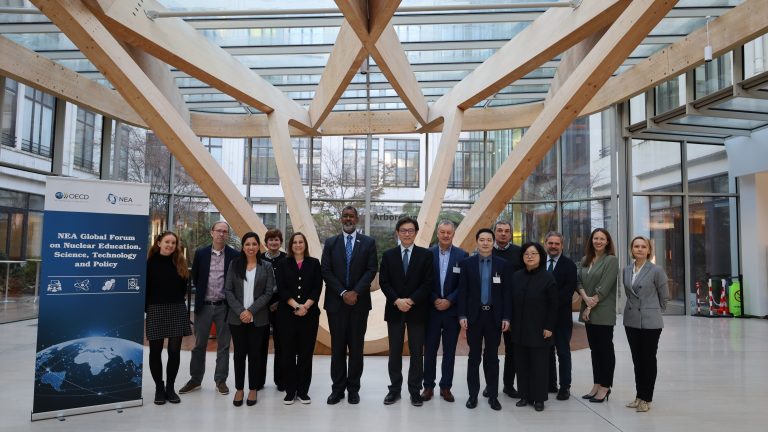On November 21 and 22, 2024, the NEA Global Forum on Nuclear Education, Science, Technology and Policy (the Global Forum on Nuclear Education) brought together representatives of its Advisory Council at the NEA headquarters in Paris for the seventh meeting since the launch of the Global Forum on Nuclear Education in 2021.
The meeting was led by the Chairman of the Global Forum on Nuclear Education, Professor Seungjin Kim of Purdue University, USA, with the support of the Vice-Chairman, Professor Sungyeol Choi of Seoul National University , in Korea. NEA Director General William D. Magwood, IV, joined the meeting to deliver a special address, highlighting the efforts made thus far by the Global Nuclear Education Forum to address the gaps in long history of nuclear education and human capacity development and recognizing the need to maintain this momentum.

The agenda for the two-day meeting included updates on progress from the chairs and co-chairs of the seven working groups, which focus on solving nuclear education challenges in the following areas:
- Achieving gender parity in nuclear technology and academia
- Defining the future of nuclear engineering education
- Rethinking the relationship between nuclear energy and society
- Revitalizing innovation in the nuclear sector to improve the future competitiveness of nuclear energy
- Restore nuclear law training programs
- Building a pipeline of science, technology, engineering and mathematics (STEM) professionals
- Develop an international study program for the back end of the nuclear fuel cycle
The annual Rising Stars Workshop, which took place on 25-26 November 2024 at the Joint Research Center (JRC) of the European Commission in Germany, was highlighted as part of the activities of Working Group 1 aimed at addressing gender balance issues in the within the sector. The Advisory Council heard updates from the newly launched groups, Working Group 6 and Working Group 7, which have strengthened their membership and established their work agenda.
Official observer organizations, including the International Atomic Energy Agency (IAEA), the European Commission (EC) and the European Nuclear Education Network (ENEN), also attended the meeting and reported on their own educational initiatives with their respective partners and stakeholders. These presentations helped to strengthen existing collaborative relationships and ensure that all opportunities to support nuclear education and training were leveraged and managed in a complementary manner.
The meeting was also an opportunity to anticipate the first Global Forum symposium, scheduled for fall 2025, organized by the University of Michigan. Professor Todd Allen, Head of the Department of Nuclear Engineering and Radiological Sciences, shared an overview of the proposed program, which will also incorporate the 2025 edition of Rising Stars.
To learn more about the Global Nuclear Education Forum, visit Web page or contact globalforum@oecd-nea.org. To be informed of future updates regarding the Global Forum 2025 Symposium, please register at mailing list.


